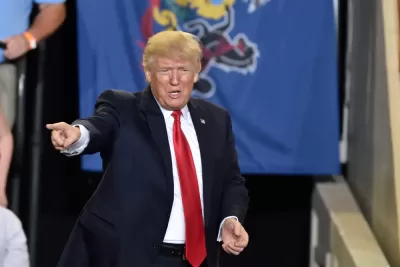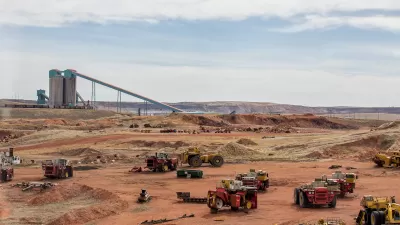The Trump administration's "energy dominance" agenda depends, in part, on growing the energy distribution network, namely pipelines, rail facilities, and ports. However, states can use the Clean Water Act to block pipelines and coal terminals.

"President Trump signed a pair of executive orders Wednesday that aim to speed approval and construction of fossil fuel projects, including the long-delayed Keystone XL pipeline, by limiting environmental reviews," reports Nicholas Kusnetz for InsideClimate News on April 11. The two orders are largely meant to expand the pipeline network needed to increase the domestic production and export of fossil fuels, part of an agenda the president calls "energy dominance."
The executive order, "Promoting Energy Infrastructure and Economic Growth," targets the Clean Water Act, specifically Section 401, "which gives states authority to authorize projects that have the potential to harm water quality," adds Kusnetz.
Supporters of more fossil fuel development have taken aim at this part of the law, arguing that states and environmental groups have used it inappropriately to delay or reject projects.
Three fossil fuel projects that have been either killed or delayed by states cited in the extensive article include:
- The Constitution Pipeline which would transport Marcellus Shale natural gas from Susquehanna County, Pennsylvania to Schoharie County, New York. [See related post].
- Washington State's denial of a water quality permit to build North America’s largest coal export terminal in Longview, Wash., although the U.S. Army Corps of Engineers has since revived that project. [Related post.].
- Oregon: The Jordan Cove Project which would export liquefied natural gas (LNG). " After conducting a preliminary review of the 401 Water Quality Certification application, the [Oregon Department of Environmental Quality] requested more information from the applicant," according to a DEQ update last December. [Related posts.].
As a result of the order, U.S. Environmental Protection Agency "Administrator Andrew Wheeler said his agency will 'soon' unveil a proposal for reining in states' ability to block energy infrastructure projects using their Clean Water Act authority," reports Kelsey Tamborrino reporter for POLITICO Morning Energy.
Among those expressing opposition to the executive order and the intent to fight it are the Sierra Club and Rep. Frank Pallone, Jr. (D-N.J.), chairman of the House Energy and Commerce Committee, while the "Western Governors' Association, whose members include the Republican governors of the nation's top energy-producing states, also questioned the move to limit states' authority," adds Kusnetz.
It issued a statement saying the governors "have concerns" about the order but are ready to work with federal officials on the new guidelines.
The second executive order, "Transportation Crossings at the International Boundaries," "appears to target the Keystone XL pipeline in particular, declaring that the decision to permit infrastructure crossing international borders 'shall be made solely by the President' rather than the State Department, to which previous administrations had delegated the authority," reports Kusnetz. Last November, a federal judge in Montana halted construction of the pipeline.
Trump issued exactly such a permit in March for Keystone XL, and both the permit and the new order appear to be attempts to sidestep a legal challenge.
Critically, having the president issue the permit directly, rather than going through the State Department, could make it more difficult for environmental and indigenous groups to challenge cross-border permits under the National Environmental Policy Act, which subjects major federal agency actions to careful review.
According to Joshua Galperin, an expert in environmental law at the University of Pittsburgh School of Law, the strategy may just work. On April 8, Calgary-based TransCanada Corp., "the company behind the pipeline, filed a motion seeking to have the case dismissed and the injunction lifted," adds Kusnetz. "The company asserted that the arguments against the original permit are moot now."
Expect more lawsuits, added Galperin.
FULL STORY: Trump Aims to Speed Pipeline Projects by Limiting State Environmental Reviews

Alabama: Trump Terminates Settlements for Black Communities Harmed By Raw Sewage
Trump deemed the landmark civil rights agreement “illegal DEI and environmental justice policy.”

Study: Maui’s Plan to Convert Vacation Rentals to Long-Term Housing Could Cause Nearly $1 Billion Economic Loss
The plan would reduce visitor accommodation by 25% resulting in 1,900 jobs lost.

Planetizen Federal Action Tracker
A weekly monitor of how Trump’s orders and actions are impacting planners and planning in America.

Waymo Gets Permission to Map SF’s Market Street
If allowed to operate on the traffic-restricted street, Waymo’s autonomous taxis would have a leg up over ride-hailing competitors — and counter the city’s efforts to grow bike and pedestrian on the thoroughfare.

Parklet Symposium Highlights the Success of Shared Spaces
Parklets got a boost during the Covid-19 pandemic, when the concept was translated to outdoor dining programs that offered restaurants a lifeline during the shutdown.

Federal Homelessness Agency Places Entire Staff on Leave
The U.S. Interagency Council on Homelessness is the only federal agency dedicated to preventing and ending homelessness.
Urban Design for Planners 1: Software Tools
This six-course series explores essential urban design concepts using open source software and equips planners with the tools they need to participate fully in the urban design process.
Planning for Universal Design
Learn the tools for implementing Universal Design in planning regulations.
Caltrans
Smith Gee Studio
Institute for Housing and Urban Development Studies (IHS)
City of Grandview
Harvard GSD Executive Education
Toledo-Lucas County Plan Commissions
Salt Lake City
NYU Wagner Graduate School of Public Service




























